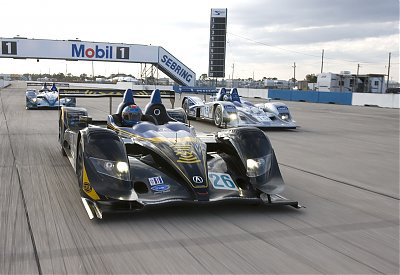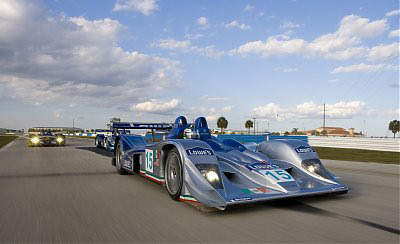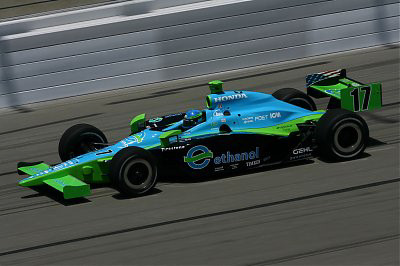The Way It Is/ Who has the courage and strength to take racing into the future? Part Two
by Gordon Kirby Audi's ground-breaking R10 turbo diesel has already spawned a rival. French car manufacturer Peugeot--Le Mans winners in 1992 & '93--has designed, tested and successfully started racing its new 908 HDi turbo diesel. In fact, the new Peugeot won the opening European Le Mans Series race of the year at Monza last month. The Monza race was only five hours in length and there are worries about the Peugeot's reliability over twenty-four hours but the new car has shown it will be a challenger to the all-conquering Audis at Le Mans next month.
Audi's ground-breaking R10 turbo diesel has already spawned a rival. French car manufacturer Peugeot--Le Mans winners in 1992 & '93--has designed, tested and successfully started racing its new 908 HDi turbo diesel. In fact, the new Peugeot won the opening European Le Mans Series race of the year at Monza last month. The Monza race was only five hours in length and there are worries about the Peugeot's reliability over twenty-four hours but the new car has shown it will be a challenger to the all-conquering Audis at Le Mans next month.
Peugeot's Audi-challenging turbo diesel is another sign of the revitalization of international sports car racing, particularly the ACO-affiliated LMS and ALMS series. One of the Peugeots at the Sarthe this year will be co-driven by Le Mans hometown boy Sebastien Bourdais, an exceptional open-wheel racer who is also an outstanding long-distance sports car racer.
"It's great to be part of it," Bourdais grins. "It's a fun car to drive. The engine drives like a race engine. There's still a lot of tuning work to be done, but it drives very well."
Bourdais says Peugeot took on the technical challenge of racing a turbo diesel rather than going a more conventional route which wouldhave produced more sheer performance. "After studying the requirements of a diesel engine Puegeot knew that to kick Audi's butt, they would be better off to have a turbo gasoline engine rather than a diesel," Bourdais commented. "This is because of the way the equivalency formula is written as far as the weight of the car and everything else. But the reason Peugeot is in there with the turbo diesel is because there's a technological challenge that they want to go after."
One of the reasons for Bourdais's success is that he is an intelligent, engineering-minded driver and the three-time Champ Car champion believes the time has come for green fuels in racing. "I think it's true that it would be best to find some kind of formula where on the environmental and societal side racing would really contribute to green technology," Bourdais said. "It's getting harder to find sponsors in Europe in the past few years and it's also beginning to happen in the United States, because they don't want to be associated with something that's got a bad reputation. So it's time to find the right formula, but what it is, I'm not quite sure.
"Diesel is much cleaner than gasoline when you burn it this way, but it still isn't green," he added. "Anything that's really green is going to give you a huge power loss and you need to have a much bigger engine to get something done. So it's very unclear right now what the right format would be."

© LAT
Is it possible therefore, to write a set of rules based on a certain amount of energy which would allow a variety of different fuels with a reasonably level, competitive playing field? "It's easy to calculate the energy of any given fuel," commented Honda's Robert Clarke. "But each fuel has its own characteristics. So, yes, you can calculate the power potential of any given fuel and design a regulation around that.
"The trick is to keep the ultimate performance of those products at an even level. The problem is that with each having a different characteristic as far as the potential torque that they could develop, cooling and such, they're never truly equal. One may have an advantage over another and there's no way around equivalency rules. It's up to the sanctioning body to continue to dial them in and adjust them in order to get them as close as possible."
Porsche engineer Thomas Laudenbach believes the right formula for the future should be about the overall efficiency of the entire car. "It has to be a complete package, not only fuel, but everything--the total weight, friction, fuel--to make a good, efficient package," Laudenbach observed.
Of course, any racing formula encourages the best overall efficiency, so this goal is an essential part of the sport. But Laudenbach emphasized that, also as a matter of course, racing continues to develop products and processes which are then adopted by the automobile industry. He points to DLC or diamond-like carbon coatings which have been applied to the reciprocating parts of many racing engines for ten or more years.
"One very well-known example is these coatings which have been used for many years in racing in all different kinds of engines," Laudenbach said. "Now it is starting to find its way into mass production. This again is where racing can really drive the industry in the right direction. This is purely reduction of friction which means efficiency."
Both Laudenbach and his colleague Dr. Frank-Steffen Walliser reiterated the importance of weight in the overall equation. "The one major issue for the car industry will be weight," Walliser said. "It was always and it will be again."
Laudenbach believes the weight aspect is one of the most underestimated parts in the public discussion about improved vehicle efficiency. "There's been a lot of discussion about different fuel types and ways to reduce the CO2 and improve engine efficiency," Laudenbach noted. "But I hope for more public discussion about working on the efficiency of an engine, maybe in conjunction with different fuel types.

© LAT
"It's about the complete car, the engine, the power train, everything. The less weight you have the more fuel you save in acceleraton, braking, all aspects."
The Porsche guys also believe that cost-efficiency should be applied to the formula for the future. "I think you shouldn't work with exotic materials like they have in Formula One which are horribly expensive," Laudenbach commented. "I think the thing is to say, where can I achieve improvement for a complete car while spending the smallest amount of money?"
Added Walliser: "In road car development we always make a measurement in dollars per kilogram and that leads in the right direction. Even if it's only a hundred grams, it makes the car more efficient. If you can spend less to achieve it you are on the right track."
With more than thirty years of frontline experience under his belt, John Ward is one of American racing's most travelled race engineers. Ward designed Indy and IMSA GTP cars with Dan Gurney for All American Racers and has worked as a race engineer for a number of top CART and IRL teams. Ward currently engineers Adrian Fernandez's Acura ALMS car and is a big proponent of finding ways to re-introduce technology into today's spec car-dominated world. He's thought long and hard about how to achieve this goal.
"A big question is how are you going to pay for it?" Ward observed. "You would do it mostly through the manufacturers, but I also wonder if they would be willing to take the hit if something goes wrong. Let's say they chose a path in selecting a fuel that becomes not competitive and company B chose a better path. Either the equivalency didn't work, or one did a better job than the other. Will a big manufacturer take a hit on that? They might just pull out."
Having watched deeply damaging battles between manufacturers in both IMSA and CART, Ward cautions against allowing the manufacturers to wield too much influence. "If you allow the manufacturers to determine the rules they're going to narrow it down so nobody will be too adventurous," Ward warned.
Ward sees high-tech billionaires and other entrepreneurs as possible sources of funding beyond the manufacturers for green fuel technology. "I guess the other people who might fund it would be the Paul Allens of the world, the same people who put up the Ansari prize to launch people into space," Ward ruminated. "Why are they spending money on that? I guess it's because it makes them money in the end, but it's a long way off. The same thing with green fuel technology.
"If my company owns the technology that nobody else has, it's worth it to me to gamble. I can feel good as a billionaire gambling fifty million on something like this because I can raise venture capital because I'm going to develop something new. It's a long shot, but let's enjoy it while we're doing it and we'll be doing something good for the world. We all see a crisis with global warming and the need to try to reduce emissions. How are we going to do this?"

© LAT
Over the years it can fairly be said that the IRL, Champ Car and Grand-Am have shown the NASCAR model of fender-to-fender racing does not work anywhere near as well in open wheel or road racing. But other than ALMS, all the sanctioning bodies are afraid of pursuing anything but the NASCAR model.
"People say it would become like a giant science experiment," Ward commented. "It wouldn't be entertainment like NASCAR is entertainment. It wouldn't necessarily be about close competition. It would be about interesting cars and technology and how they stack up. It wouldn't work based on the NASCAR blueprint. But for sports car racing, I reckon it would work."
A strong, smart sanctioning body, the likes of which we've never seen outside NASCAR, is essential to making it happen. "The key is that somebody's got to pull it together and get the nucleus started," Ward remarked. "And that's going to be tough. I reckon it's as simple as defining the amount of energy you have to do to do the race. You want some obvious safety elements defined in the rulebook but you need a minimum amount of rules governing the safety and the chassis. You need to keep it as open as you can but focus on energy useage."
Bourdais says a dispassionate meeting of the minds is required by some of racing's top engineers and designers. "You need to take five engineers from the top teams and put the positives and the negatives around it," Bourdais suggested. "You've got to be rational about it. You can't have manufacturers pushing for certain things because they control certain technologies rather than others. It is hard, no question. But you've got to look at it rationally and define what's the best source of energy and go from there. After you make that decision, it becomes a lot easier."
Robert Clarke says Honda believes hydrogen fuel cells will be the best longterm choice for an alternate energy source in automobiles. "Honda is one of the companies that's put its stake in the ground for hydrogen fuel cell technology," Clarke commented. "We believe that is the ultimate fuel. I think we view these other things like ethanol and clean diesel as being more transitional. We believe that hydrogen, because of its abundance and the way it works in fuel cell technology, is the ultimate solution.
"The technology itself isn't quite there although we do have production prototype cars out that the public are using and we're evaluating. I think we're a little further along than any other manufacturer in that regard. It's not ready for mass production and definitely not ready for mass use. The system and the handling of it to refuel your car can all be dealt with, but it's not there yet. Unfortunately, there are also political undercurrents fighting against it.
"Part of it is also convincing people that it's real and that it works," Clarke added. "That's part of getting these cars out to the public and letting them experience them. I haven't driven it myself, but in the reports I've read it's very impressive. It has good performance and is very quiet. It's basically an electric car."
Racing is as much an aural as a visual experience and I personally can't imagine a quiet motorsport without any exhaust notes. But Clarke begs to disagree. "I think we're old-school," he professed. "I think the noise is part of what we grew up with and what we equate with racing. But I think that for the most part noise is not a good thing at levels that are damaging to the hearing and the ability to carry on a conversation. I think there's a unique sound to these new powerplants that are coming and in time they will grow as appealing as the current product that we're more used to.
"I think you'd be amazed at how unique the sound would be if we had a field of furbo diesels. I think it's an emotional connection and something that will develop over time."
Clarke would love to see the Indianapolis 500 convert to a fuel cell formula. "Imagine the start of the Indy 500 with all hydrogen fuel cell cars," he grinned. "What you would hear would be the sound of the air. I think it would be a really special sound. Thirty-three cars barreling down the straight at 200 mph pushing all this air that you don't hear today because of the noise of the engines. It might not be bad. It might be a good thing."
AutoExtremist publisher Peter de Lorenzo has founded a hydrogen racing league with plans to launch a hydrogen fuel series in 2009. Clarke has read de Lorenzo's rules and argues against any artificial way to make an exhaust sound. "In their rules they actually talk about having a sound signature as a requirement, so you would actually generate a unique sound so that it's not deathly quiet," Clarke commented. "I don't know if I'm in favor of that because that's very artificial."
I'm pleased to say that Bourdais agrees with de Lorenzo and me that you must have an exhaust note from a racing car. "It's boring without it. It might go against attracting the fans. I don't know. Again, all these things have to be taken into consideration."
Bourdais also offers a contrarian view of the way racing should promote itself. "There is not one solution," he remarked. "But I think we are going to have to change our way of life a little bit. But at the same time you have to remember that what we do in racing is a drop in the ocean as far as the pollution side of things. We're going racing because it's cool. It generates jobs and it generates entertainment and income for many different businesses and communities, and it's alright.
"So another question is, 'Do we need to change it?' Maybe not. You don't want to change it so the show becomes stupid and senseless. Maybe the people who run the sport need to inform the public more and change the perception of the people about the sport."
Again, it's the test of the sanctioning body to step up and do all these things correctly as NASCAR has done for its constituency and market. But the fact is that historically no sanctioning body has been able to write, adjust and effectively enforce equivalency formulae. The SCCA failed spectacularly with the original, unlimited CanAm, and IMSA failed equally with the old GTP category. Part of CART's eventual blow-up was triggered when Ilmor and Penske designed and built the single-cam 209 Mercedes-Benz engine in 1994 to gain a performance advantage but also, in Mario Ilien's mind at least, to teach the sanctioning body about the folly of equivalency formulae.
"It's a no-win situation," Robert Clarke observes. "You're always going to have political positioning by the manufacturers, trying to get an advantage. But that's the nature of the sport, and it's part of the fun, I guess. To me, it's all part of the equation.
"The struggle is not just the politics but the struggle with the sanctioning groups that deal with the equality of the different fuels. There's no perfect answer and that's a struggle."
Clarke closes the conversation. "Today can be a very exciting era for motorsports," he said. "We can screw it all up and ruin it, but there's a great opportunity in all this for the sanctioning body capable of doing the job right."
Auto Racing ~ Gordon Kirby
Copyright 2007 ~ All Rights Reserved
Copyright 2007 ~ All Rights Reserved
Top of Page